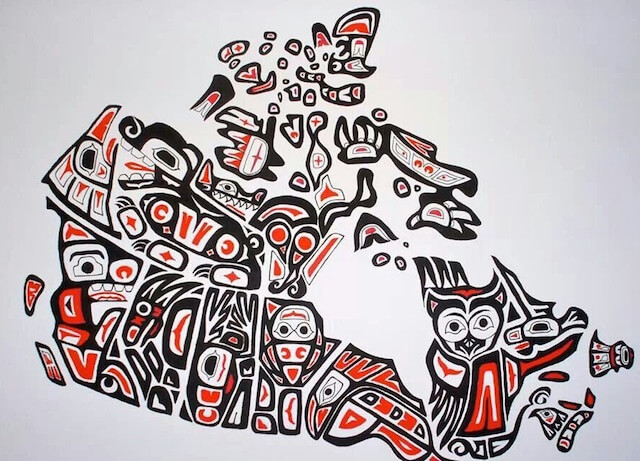
Probably my biggest takeaway from my time in ECS 101 is the importance and complexity of our journey toward reconciliation with our Indigenous Peoples. Even though we are often taught about Indigenous culture, and the hardships and genocide that they faced in residential schools, it is rarely acknowledged in the classroom that we still hold a responsibility for a better future. Part of reconciliation is understanding that our Indigenous brothers and sisters are an incredibly resilient peoples. Indigenous peoples were never “conquered” as some of the textbooks make them out to be, and they were never “defeated.” Indigenous culture still burns bright in its peoples, but it is our responsibility to better educate today’s youth as to importance concepts such as racism and ethnocentrism. Above all else, we need to ensure that the past never repeats itself.

For my aesthetic piece of this project, I wrote a poem called “The Everlasting Treaty.” The poem revolves around a residential school survivor, performing everyday tasks that many of us would not think twice about. In the poem, there is a voice described only as “they,” which is telling her to “move on.” The problem is that no matter what she does, everything in her life reminds her of the years she spent in that residential school. The road she drives to get to her home reminds her of the road she attempted to escape upon in the coldness of winter. Her home does not feel like a home, for the darkness under her patio reminds her of the darkness she encountered beneath the residential school, where she found the remnants of human bones (referenced from the documentary “Muffins for Granny”: Sharpe, 2007). Finally, the darkness from the hallway, and the light she accidentally left on in one of her rooms, reminds her of when a priest called her to his office and sexually abused her. The poem ends on a hopeful note, when the judgmental voice of “they” is replaced by the understanding voice of “we,” who ultimately seeks to restore an emotional and spiritual balance through making history more accurate, and through honoring the treaty rights. This reflects what I believe my role is, as a teacher.

The Everlasting Treaty
“Why are you still angry?” They asked,
Their eyes rolling and blind.
But she kept driving, gravel crunching like
Dozens of small feet, fleeing to a place they could never find.
She remembered that road, a memory
She wished to keep out.
The snow had been ablow that night,
Hovering as the flashlights gained on their route.
Escape was impossible, for that night was much colder.
Yet nobody could see those old footprints but her.
“Just move on, already!” They groaned
As she got out of the car, dragged herself up the drive.
That place had been demolished long ago,
But as she walked up her drive, somehow it had survived.
The patio was dark, an underbelly obscured.
Wait, what are those? Are they bones?
Right beneath her welcome matt,
Did they belong to those forever unknown?
The school had since been lit ablaze.
But here it was again: that same old place.
“Keep moving” They encouraged.
They didn’t know she’d been moving her whole life.
Every place looked the same.
As she opened that door, so returned the strife.
The light was on, in her dim corridor.
Beneath the door came a glow, pasty, yellow, and light.
It’d been dim then, too, in that room
When the priest called her by number in the night.
“There’s nothing to be afraid of” They promised,
Although she knew better.
Nothing can leave
When the eyes are windows and are tethered.
“It is wrong to forget.” We said.
“For the past is carved in contorted letters.”
She knew this too well, so her lips quivered and said,
“The treaty holds, we can still be together.”

Recent Comments